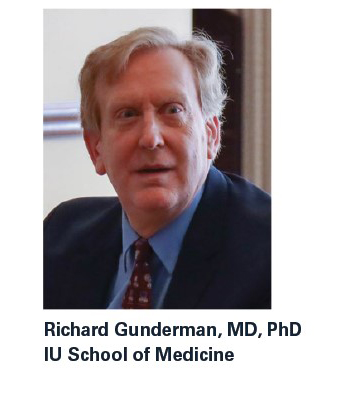By: Richard Gunderman, MD, PhD
IU School of Medicine

There are many reasons physicians might feel lonely. Some practice telemedicine, working remotely with patients and colleagues. Others are so busy, constantly moving from patient to patient at high speed, that they have no time to connect with anyone. Others are dealing with professional or personal issues that they feel ashamed to share with anyone else, leaving them feeling isolated even amid the company of others. Still others are dealing with depression, anxiety, or substance abuse issues that leave them progressively more curled in on themselves and distanced from others.
To cope with such challenges, many need the help of loved ones, colleagues, friends, or mental health professionals. But insight and comfort can also come in unexpected forms. Consider one of the greatest short stories ever written, by perhaps the greatest novelist who ever lived. In “Where Love Is, God Is,” published in 1885, Leo Tolstoy tells the tale of a poor cobbler named Martin. Martin lived and worked alone in his basement apartment, below street level, so that he could see and recognize passersby only by their feet, and he never aimed at anything more than doing his job well.
Martin had suffered many losses in life. Years ago, his wife died, but not before the loss of all of their children but one. More recently, even his one remaining son had died. Now Martin was all alone, and he questioned why God would allow such terrible things to happen to him. One day, a religious person visited Martin, telling him that he should lead a life devoted to God. Martin was so impressed that he immediately went out and bought a Bible. At first, he read it only on holidays, but with time, he spent more and more time with it, until eventually he read it whenever he was not working, finding peace and joy.
Yet Martin desperately wanted to see God. One night, as he slept, he thought he heard the voice of God tell him to expect a visit the next day. Upon arising, Martin cleaned up his hovel and put on his best clothes, awaiting his epiphany. Instead, however, he saw nothing outside his window but an old man struggling to shovel snow. Martin invited the old man inside to warm up, sharing a hot drink and some of the stories he had read in Scripture. The old man thanked him for nourishing both his body and his soul. Then Martin went back to awaiting the divine arrival, certain that it would transform his life.
Instead, however, Martin saw outside a young woman, ill-dressed for the inclement weather and holding a baby in her arms. Martin invited her inside, where he gave her some food, warm clothes, and money, sharing with her the difference his faith was making in his life. She thanked him and left. Next, he saw a boy stealing from an old woman selling apples. He went outside and spoke to them both, persuading the boy to return what he had stolen and the woman to forgive the boy. Martin’s compassion, treating each as a person, enabled them to see one another as persons and reconcile.
Later that night, Martin found himself bitterly disappointed. Expecting this day to be the best of his life, the one on which he would meet God, he felt abandoned and alone. But then each person he had helped reappeared before him, the old man, the young mother, the old apple vendor and the thief, each promptly vanishing. Martin turned to his Bible and read, “I was hungry, and you gave me food; I was thirsty, and you gave me drink; I was a stranger, and you took me in. Inasmuch as you did it for each of these, the least among us, you did it for me.” Martin realized that his dream had been fulfilled.
Tolstoy’s story offers deep insight for physicians, other health professionals, and all human beings. Loneliness often stems less from the fact that we are alone than a failure on our part to understand what we really are. At first, Martin thought only of himself and what he had been deprived of. He was caught up in a downward spiral of self-pity. Then he began reading, and began seeing his life, and life itself, in a new way. He learned that he was part of something bigger, and that true flourishing comes not from bending everything to our will but aligning our will with higher purposes.
Martin was waiting for something to come to him, but without realizing it, his reading and meditation had been preparing him to reach out to someone else. Instead of ignoring what was outside his door, he had become the sort of person who took an active interest and reached out to those in need. He did not have much, but what he had, he was willing, even eager, to share with others. Instead of worrying about what others, or fate, or God should be doing for him, he learned to see and feel anew, to ask himself what he could be doing to make a difference for others, and in some small way help bring goodness to greater fruition.
It was not clinging tightly to all that he could get his hands on that opened up a new, no longer lonely life for Martin. Instead, it was extending the hand of hospitality and generosity to others. Like Martin, we too may find ourselves waiting for someone to come along and rescue us, when what many of us most need is an opportunity to serve others – not just to increase patient throughput, decrease wait times, or optimize revenue streams, but actually to serve our fellow human beings, first and foremost because it is what we are called to do. In answering this call, we dissolve loneliness, much as the warm sun disperses fog.
Richard Gunderman, MD, PhD, is the chair of the ISMA Wellness Steering Committee.